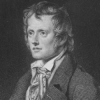John Clare

John Clare
John Clarewas an English poet, the son of a farm labourer, who came to be known for his celebratory representations of the English countryside and his lamentation of its disruption. His poetry underwent a major re-evaluation in the late 20th century, and he is now often considered to be among the most important 19th-century poets. His biographer Jonathan Bate states that Clare was "the greatest labouring-class poet that England has ever produced. No one has ever written more powerfully of...
NationalityEnglish
ProfessionPoet
Date of Birth13 July 1793
I was Byron and Shakespeare formerly.
I am the self-consumer of my woes,
The snow has left the cottage top; The thatch moss grows in brighter green; And eaves in quick succession drop, Where grinning icicles have been, Pit-patting with a pleasant noise In tubs set by the cottage door; While duck and geese, with happy joys, Plunge in the yard pond brimming over. The sun peeps through the window pane: Which children mark with laughing eye, And in the wet street steal again To tell each other spring is night.
And fairy month of waking mirth From whom our joys ensue Thou early gladder of the earth Thrice welcome here anew With thee the bud unfolds to leaves The grass greens on the lea And flowers their tender boon receives To bloom and smile with thee.
Now summer is in flower and natures hum Is never silent round her sultry bloom Insects as small as dust are never done Wi' glittering dance and reeling in the sun And green wood fly and blossom haunting bee Are never weary of their melody Round field hedge now flowers in full glory twine Large bindweed bells wild hop and streakd woodbine That lift athirst their slender throated flowers Agape for dew falls and for honey showers These round each bush in sweet disorder run And spread their wild hues to the sultry sun.
Loud is the summer's busy song The smallest breeze can find a tongue, While insects of each tiny size Grow teasing with their melodies, Till noon burns with its blistering breath Around, and day lies still as death.
Tasteful illumination of the night, Bright scattered, twinkling star of spangled earth.
I lost the love of heaven above I spurned the lust of earth below I felt the sweets of fancied love And hell itself my only foe.
Forgive me if, in friendship’s way, I offer thee a wreath of May.... [N]ourished by the dews of heaven.... So I have Ivy placed between, To prove that worth is ever green. The little blue Forget-me-not... Spring’s messenger in every spot, Smiling on all—"Remember me!
And what is Life? - An hour-glass on the run
My fears are agitated to an extreme degree and the dread of death involves me in a stupor of chilling indisposition.
I hid my love when young till I Couldn't bear the buzzing of a fly; I hid my life to my despite Till I could not bear to look at light: I dare not gaze upon her face But left her memory in each place; Where'er I saw a wild flower lie I kissed and bade my love good-bye.
While snow the window-panes bedim, The fire curls up a sunny charm, Where, creaming o'er the pitcher's rim, The flowering ale is set to warm; Mirth, full of joy as summer bees, Sits there, its pleasures to impart, And children, 'tween their parent's knees, Sing scraps of carols o'er by heart.
The thorn tree just began to bud And greening stained the sheltering hedge, An many a violet beside the wood Peeped blue between the withered sedge; The sun gleamed warm the bank beside, 'Twas pleasant wandering out a while Neath nestling bush to lonely hide, Or bend a musings o'er a stile.